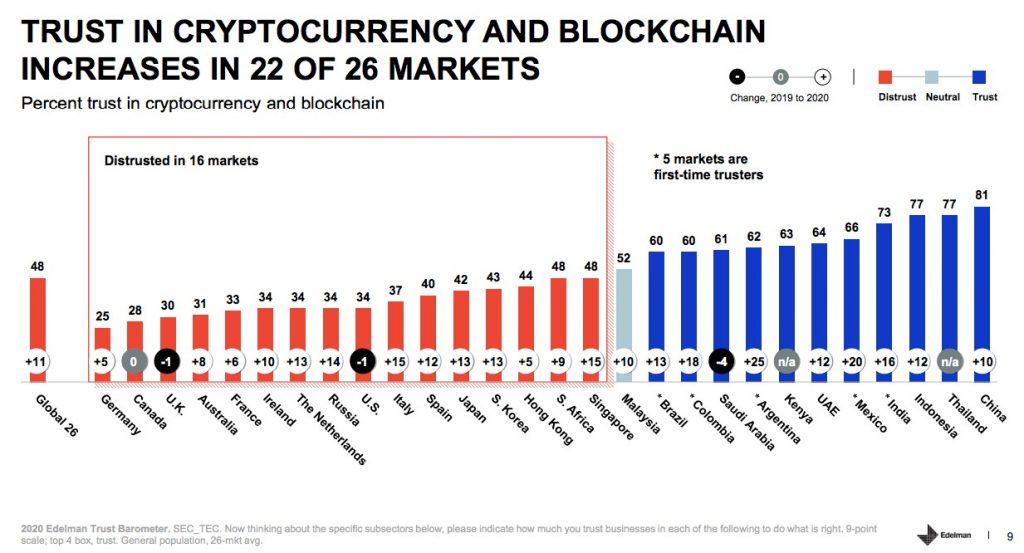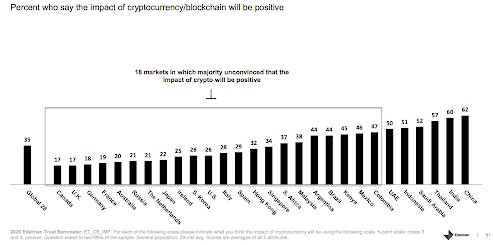Table of Contents
Bitcoin (BTC) is one of the most sought after assets amongst investors. But, despite its surging popularity, news covering BTC often quote gossip and hearsay.
And due to their massive reach, people consider them as official information.
It is essential to glean facts from the fluff. BTC’s design heavily borrows from mathematics and cryptography. The protocol functions with code and calculations.
Therefore, every discussion surrounding bitcoin should be logical and rational. And that can only happen by shunning ‘myths’ and ‘rumors’.
In this article, we intend to do exactly that. So that you can see BTC for what it is, and not how it appears.
Bitcoin Has No Intrinsic Value
Naysayers say that BTC doesn’t have any intrinsic value. They also say that bitcoins just ‘appear out of thin air’.
Get WazirX News First
An asset or a currency derives value out of people’s faith, e.g: the INR. More the trust, the more is the value.
Contrary to misconceptions, a large section of people has faith in BTC. This is perfectly visible from the latest Edelman Trust Barometer Survey.
As per the report, 73 percent of Indians trust cryptocurrencies and blockchain technology.
60 percent say that the impact of crypto/blockchain will be positive.


Apart from this, bitcoin’s value has exponentially appreciated over the last several years. This couldn’t have happened if investors didn’t think of BTC as ‘valuable’.
Also, bitcoins don’t ‘just happen’. A process called mining creates BTC. Folks with advanced hardware compete within themselves to quickly solve complex mathematical puzzles. To know more, check out the video below:
Criminals Use BTC
Some believe that bitcoin transactions are anonymous. And that makes BTC a suitable vehicle for all sorts of illegal activities.
Bitcoin operates on a blockchain-based protocol. It is a decentralized public ledger that records all BTC transactions. What this means is that all activities are openly visible to everyone.
An alphanumeric address masks the details of transacting parties. But, everything else like the transaction value, date, time is completely accessible.
That makes bitcoin ‘pseudo-anonymous’. As opposed to ‘pro-criminal’ claims, this feature helps law-enforcement authorities in nabbing felons. See the below video to know more:
Bitcoin Was Hacked
No, that’s not true. If Bitcoin was hacked, it wouldn’t have gained the trust of millions of investors across the country.
Hacking Bitcoin is near impossible. Because of its blockchain.
A ’51 percent attack’ could help gain control of the Bitcoin network. But, going by how much the ecosystem has matured, a 51 percent attack will be a very costly proposition. How costly?
According to data, it would cost almost USD 500,000 an hour to carry it out. No hacker would shell out that kind of money. Plus the chances of breaking in are minuscule to zero.
It’s a Ponzi Scheme
Normally a Ponzi scheme has a hierarchical arrangement with a boss at the top. The person who starts it all. Investors are guaranteed fixed returns on their capital but the underlying mechanism is fraudulent.
Although Satoshi Nakamoto created Bitcoin in 2009, he remains unknown. He/She designed the network so that anyone can participate and either contribute to its growth or just invest in BTC.
No central authority controls Bitcoin. There are no ‘middlemen’ facilitating transfers. And it will continue to remain that way in the foreseeable future.
BTC Investment is Costly
A lot of people, especially in India don’t buy bitcoin because they think it’s costly. They think they have to buy one whole BTC. Going by the ongoing market rates they bow out.
Here’s the fact. Despite rumors of a ‘highly-priced investment’, anyone can buy bitcoin. Why? Because 1 BTC is divisible into 100 million parts. That’s right. Because of its divisibility, investors can buy fractions of bitcoin.
It is not at all necessary to buy 1 full BTC.
Only Technically Proficient People Can Use It
This was said about the internet and email too. Initially, nobody understood how these two technologies would be utilized in the real world. But eventually, both have become widely popular and now life is very difficult to imagine without the two.
This holds for bitcoin too. There is a learning curve involved but it’s not rocket science. We at WazirX have put together an intuitive interface in place so that using BTC becomes a seamless experience.
See the below video to know how to use the WazirX phone app in detail:
These were a few bitcoin myths, but there are many more. BTC and the cryptocurrency ecosystem is paving the way for a bright future. To become a part of this future, you need to question everything that you come across, even hard facts. Only by ‘verifying’ and not blindly trusting, you can truly contribute to Bitcoin’s growth.
Further Reading:
5 Ripple (XRP) Myths you Should Stop Believing
Frequently Asked Questions
How To Create Bitcoin Account?
Firstly, Go to the WazirX website and sign up. Then, a verification mail will be sent to you. The link sent via verification mail would be available only for a few seconds so make sure you click on the link sent to you as soon as possible, and it will verify your email address successfully. The next step is to set up security, so select the most suitable option for you. After you have set up the security, you will get a choice to either proceed further with or without completing the KYC procedure. After that, you will be directed to the Funds and Transfer page, where you could start depositing Bitcoins to your wallet. You can also deposit INR and then use it to buy Bitcoin for your WazirX Bitcoin wallet.
How To Make Bitcoin?
Bitcoin mining is not just the process of putting new Bitcoins into circulation, but it is also an essential part of the blockchain ledger's upkeep and development. It is carried out with the assistance of highly advanced computers that answer challenging computational math problems. Miners are rewarded for their efforts as auditors. They are in charge of ensuring that Bitcoin transactions are legitimate. Satoshi Nakamoto, who is the founder of Bitcoin, innovated this standard for keeping Bitcoin users ethical. Miners help to prevent the "double-spending problem" by confirming transactions.
How Many Bitcoins Are There?
There are 18,730,931.25 Bitcoins in circulation as of June 2021. The total number of Bitcoins that would ever be there is just 21 million. On average, 144 blocks are mined every day, with 6.25 Bitcoins per block. The average number of new Bitcoins mined every day is 900, calculated by multiplying 144 by 6.25.
What Is Bitcoin?
Bitcoin is a decentralized digital currency that may be purchased, traded, and traded without intermediary like a bank. Bitcoin is built on the blockchain, which is a distributed digital ledger. Wei Dai suggested a new kind of money that relies on cryptography rather than a central authority to oversee its production and transactions on the cypherpunks mailing list in 1998. Bitcoin was the first application of that notion. In 2009, Satoshi Nakamoto sent out the first Bitcoin specification and proof of concept to a cryptography mailing group.
How Does Bitcoin Work?
The blockchain, a distributed digital ledger, is what Bitcoin is based on. As the name suggests, blockchain is a linked database made up of blocks that store information about each transaction, such as the date and time, total amount, buyer and seller, and a unique identifier for each exchange. Entries are linked in chronological order to form a digital blockchain. Entries are linked in chronological order to form a digital blockchain. Blockchain is decentralized, which means any central authority does not control it.
How Bitcoin Works?
Bitcoin is based on the blockchain, a distributed digital ledger. As the name implies, blockchain is a connected database made up of blocks that hold information about each transaction, such as the date and time, total value, buyer and seller, and a unique identifier for each exchange. Entries are linked in chronological sequence, forming a digital chain of blocks. Blockchain is decentralized, meaning a centralized institution does not own it
How To Convert Bitcoin To Cash?
There are many ways of converting Bitcoin to cash, such as crypto exchanges, Bitcoin ATMs, Bitcoin Debit Cards, Peer to Peer Transactions. You can use cryptocurrency exchanges such as WazirX for this. Unlike typical ATMs, which allow you to withdraw money from your bank account, a Bitcoin ATM is a physical location where you may buy and sell Bitcoins using fiat currency. Several websites provide the option of selling Bitcoin in return for a prepaid debit card that may be used just like a standard debit card. You can sell Bitcoin for cash through a peer-to-peer platform in a faster and more anonymous manner.
What Is Bitcoin And How Does It Work?
Bitcoin is decentralized digital money that may be bought, sold, and exchanged without an intermediary such as a bank. Bitcoin is based on a blockchain that is considered to be a distributed digital ledger. As the name suggests, blockchain is a linked database made up of blocks that store information about each transaction, such as the date and time, total amount, buyer and seller, and a unique identifier for each exchange. Entries are linked in chronological order to form a digital blockchain
Is Bitcoin Cash A Good Investment?
Bitcoin Cash is a hard fork of Bitcoin formed in 2017 to address Bitcoin's scalability and challenges. Bitcoin Cash seeks to make global transactions faster, cheaper, and more secure. Bitcoin Cash is now accepted by thousands of online and offline businesses all over the world. Studied correctly, Bitcoin Cash may be an investment worthy of consideration.
How Can I Get Bitcoin?
To begin, go to the WazirX website and register. After that, you will receive a verification email. The link received by verification mail will only be available for a few seconds, so make sure you click it as quickly as possible. This will successfully verify your email address. The following step is to set up security, so choose the best solution for you. After you've set up the security, you'll be given the option of continuing with or without completing the KYC process. Following that, you'll be sent to the Funds & Transfers section, where you can begin depositing Bitcoins into your wallet. You may also use INR to fund your WazirX Bitcoin wallet and then use it to purchase Bitcoin.
 Disclaimer: Click Here to read the Disclaimer.
Disclaimer: Click Here to read the Disclaimer.





















